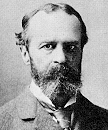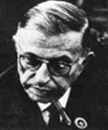
William
James (1842- 1910)
|
William
James is considered by many the father of modern
American psychology. In his main work, the monumental,
two-volume "Principles of Psychology," James
described psychology as a 'natural science,'
and developed his ideas about perception, attention,
reasoning, the stream of consciousness and emotion,
among other subjects.
In studying the source of emotions, James claimed
that, contrary to common sense, "we feel sorry
because we cry, angry because we strike, afraid
because we tremble." That is, according to the
so-called 'peripheric' (or James-Lange) theory
of emotions, a particular stimulus (a bear)
elicits specific bodily responses (trembling,
quickened heart-beats, shallow breathing); our
feeling of those responses is what gives rise
to the emotion (fear).
Although the original James-Lange theory is
no longer considered accurate, its spirit survives
in several of the current theories of emotion

Aristotle,
together with his teacher Plato, is one of
the most influential thinkers in Western culture.
His works on Physics, Biology, Psychology,
Ethics and Politics dominated those fields
for almost two millennia. Furthermore, today's
logic and scientific methodology are still,
to a large extent, Aristotelian.
Aristotle saw emotions as an integral part
of life. Emotions were distinguished from
one another based on the person's belief.
For instance, he defined fear as "a pain or
disturbance due to a mental picture of some
destructive or painful evil in the future,"
whereas anger was defined as "an impulse,
accompanied by pain, to a conspicuous revenge
for a conspicuous slight directed without
justification towards what concerns oneself
or towards what concerns one's friends."

| Jean-Paul
Sartre (1905-1980) |
Sartre
is, without doubt, one of the major exponents
of Existentialism, whose basic thesis is that
man's existence precedes his essence. That
is, "there is no human nature (...) Man is
nothing else but that which he makes of himself."
Sartre's major work was Being and Nothingness
(1943), although his philosophy is probably
best elaborated in his literary works, such
as The Wall, The Nausea,
and the three-volume The Roads to Freedom.
(Sartre was awarded the Nobel Prize in Literature
in 1964, which he declined to accept, explaining
that it would otherwise compromise his integrity
as a writer.)
In his Outline, Sartre criticized
psychological theories of emotion in their
attempt to describe the essence by the mere
accumulation of facts. The alternative, he
proposed, is a phenomenological theory, that
addresses the signification of emotions, which,
in his view, are an attempt to magically transform
the world by acting on ourselves. For example,
"the true meaning of fear (...) is a consciousness
which, through magical behavior, aims at denying
an object of the external world, and which
will go as far as to annihilate itself in
order to annihilate the object with it."
|